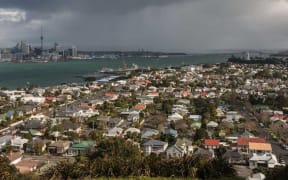The Reserve Bank plans to introduce tougher home loan restrictions in Auckland.

Reserve Bank Governor Graeme Wheeler speaking to media after the announcement. Photo: RBNZ
Bank lending to people with less than a 20 percent deposit is already limited, and the central bank is proposing to tighten measures further for residential property investors in Auckland from 1 October.
But it plans to ease limits to other parts of the country.
Planned changes:
- Residential property investors in the Auckland Council area using bank loans will be required to have a deposit of at least 30 percent.
- Banks will continue to have a limit of 10 percent of new mortgage lending to Auckland owner-occupiers with deposits of less than 20 percent.
- Outside Auckland, however, banks will be allowed 15 percent of their new mortgage lending to low deposit buyers, rather than 10 percent as now, which the Reserve Bank said reflected the more subdued housing market conditions outside the area.
"The objective of this policy is to promote financial stability by reducing the rate of increase in Auckland house prices, and to improve the resilience of the banking system to a potential downturn in the Auckland housing market," said Governor Graeme Wheeler.
While the new measures are aimed at moderating housing demand in Auckland, building more houses and apartments remained the solution in the long term, he said.
The central bank will issue a consultation paper on the new restrictions later this month.
Warning to retail banks
Mr Wheeler also issued a warning to retail banks, saying he expected them to observe the spirit of the restrictions and not seek to expand low deposit investor lending in Auckland in the lead up to the introduction of the measures.
The tougher limits do not include loans to build new homes.
The Reserve Bank is also establishing a new asset class for bank loans to residential property investors.
Banks will be expected to hold more capital against this asset class to reflect the higher risks of such lending.
The central bank also identified high levels of debt in parts of the dairy sector as a risk to the financial system, particularly with falling prices cutting farmers income.
It said about a quarter of dairy debt was owed by farmers with debt in excess of $30 a kilo of milk solids.
The central bank highlighted low global interest rates and money stimulus measures as a risk with investors seeking out riskier assets in search of better returns.
The Reserve Bank warned the eventual unwinding of these policies could disrupt financial markets, affecting the cost and availability of funding for New Zealand's financial system.

Bill English Photo: RNZ / Alexander Robertson
Earlier, Finance Minister Bill English told Morning Report the government was also concerned at soaring house prices.
"We certainly share their concern that when you have house prices rising at double digit rates that is setting people up for problems if there's a significant correction in the house prices."
Real Estate Institute figures show Auckland's median house price rose $108,500, or 18 percent, over the year to April to $720,000.
Westpac senior economist Michael Gordon doubted the rules would make much difference to prices and said the impact would be towards the lower end of the range.
Rents will go up, says investor
Property investor Andrew King said the rules would drive some investors out of the market and push up rents in Auckland.
Mr King, executive officer of the Property Investors Federation, said many rental property investors would sell to first home buyers.
"Some people may think that's a good thing - and for those first time buyers it probably is," he said.
"But those first time buyers tend to have fewer people in their property than a rental, so whenever a rental property is sold to to an owner occupier it usually means that it's pushing up demand for rental property universally." The increased demand would drive up rents, he said.
Mr King said the measures would not be effective because they had no impact on those driving prices higher, who he said were new migrants and New Zealanders returning home.
'No effect' on foreign investors
Opposition politicial parties warn foreign investors may get an easier ride in the Auckland property market as a result of the new measures.
They said the Reserve Bank had been forced to step in to cool the Auckland property market, because the Government won't.
But they warned the Bank's move to introduce tougher lending restrictions may just fuel investment from foreign speculators.
The Finance Minister, Bill English, has not been available for comment but said in a statement the Government welcomed steps by the central bank to curb the rising Auckland housing prices.
Green Party co-leader Russel Norman said the new restrictions on local borrowers meant foreign speculators will face less competition in Auckland.
"Those constraints don't apply to foreign investors because overwhelmingly they buy with cash or they're financed from offshore."
Labour Party finance spokesperson Grant Robertson said the Reserve Bank was right to take action to curb speculation but the Government's refusal to tackle foreign buyers gave them a free hand.
"The Reserve Bank can't deal with that issue of foreign speculators. Only the National government can do that and they've failed over seven years to do anything about it."




